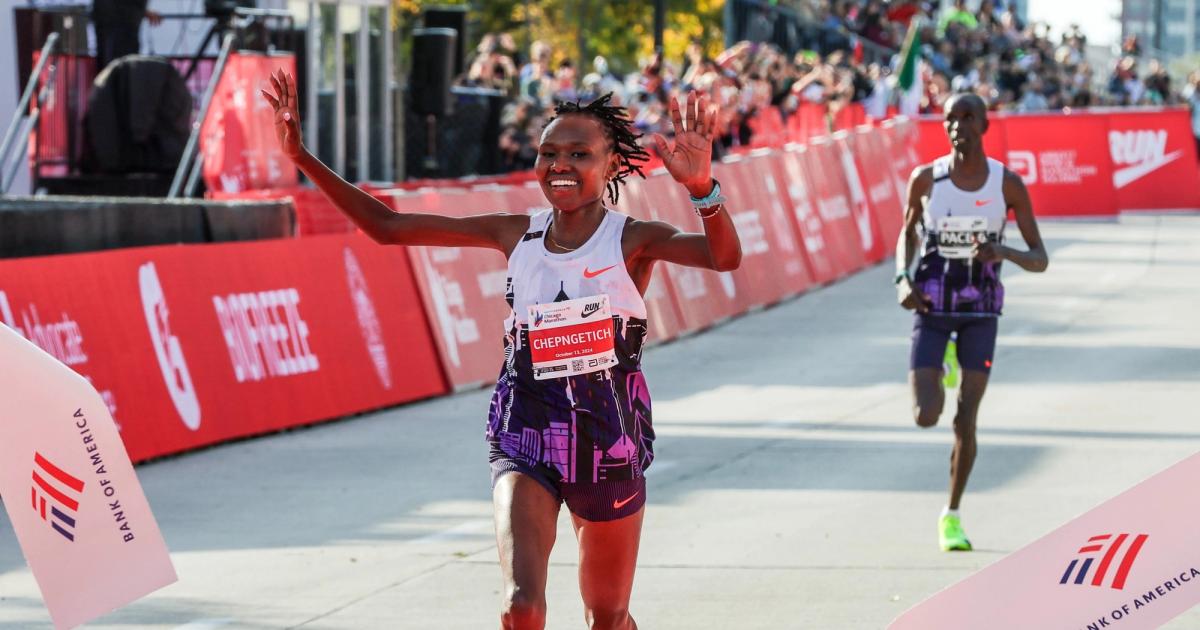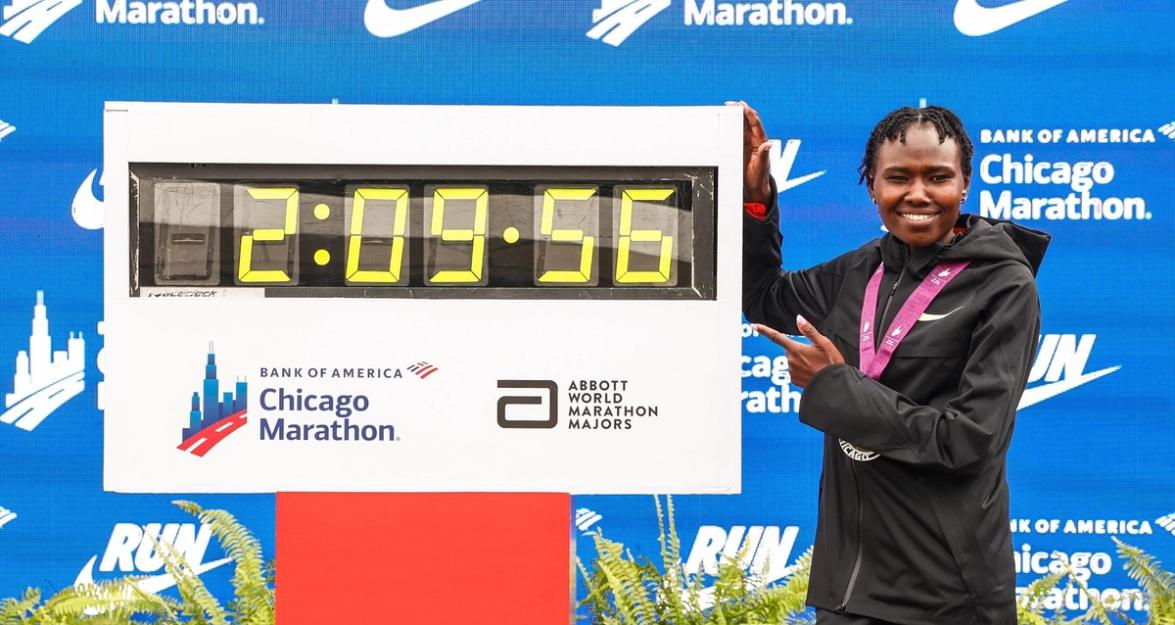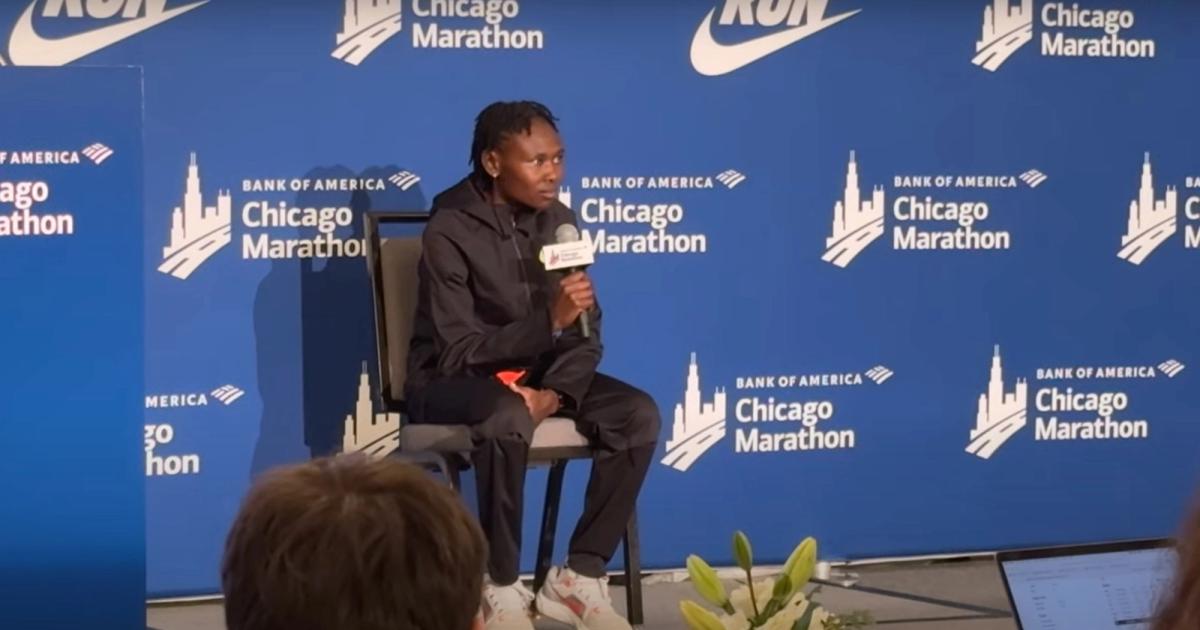By David Melly
October 16, 2024
Welcome to a brave new world.
Thanks to a combination of generational talent, rapidly advancing shoe technology, a fast course, favorable racing conditions, and… well, who really knows what else… we now live in a world where the fastest female marathoners run sub-2:10. 30-year-old Kenyan Ruth Chepngetich picked up her third Chicago Marathon title in eye-popping, history-making, mind-exploding fashion, hitting 5km in 15:00, halfway in 64:16, and hanging on to cross the finish line in 2:09:56, knocking 1:57 off a world record that was shocking as well when it was set, barely a year old.
Somewhere around mile 20, it became clear that, even as Chepngetich slowed and the insane early pace began to take its toll, she was going to break the record. But even with a few miles to go, we were all assuming the finish time would be something like 2:11. And maybe if she’d run four seconds slower, we might not all feel quite so insane, but there’s something about that big zero in the middle of the finish time that makes this particular performance feel even more brain-melting than other major recent jumps forward in the sport.
With a few days’ hindsight and enough time for our heart rates to drop back down to normal, it’s worth taking a step back to ask: what does 2:09:56 really mean? When you drill down on the details, is this a logical next step in the broader trends of elite women’s running, or have we entered a new normal heretofore unknown to the sport?

World record holder and first woman under 2:10 for the marathon, Ruth Chepngetich. (Photo by Kevin Morris / @kevmofoto)
How crazy is knocking two minutes off the world record, really? Ruth Chepgnetich actually broke Tigist Assefa’s world record by a smaller margin (1:57) than Assefa broke Brigid Kosgei’s former record (2:10). And although it took her two swings, Paula Radcliffe ultimately lowered the world record by 3:23 in the space of about six months. Percentage wise, Chepngetich took 1.5% off the record, smaller than Usain Bolt’s 1.6% improvement on the 100m WR (over three runs) or, more recently, Beatrice Chepkoech’s one-run 1.6% reduction in the steeplechase.
What makes it feel wild this time is that it’s the third big chunk taken off this particular world record in five years, after Radcliffe’s 2:15:25 stood strong for 16 years. But perhaps we’re also seeing a slight evening out effect as the popularity and depth of women’s elite running starts to grow. Since 2003, the men’s world record has been broken nine times by seven different athletes, taking 5:03 in total off the time, so with a wide-angle lens, three runners taking 5:28 off doesn’t seem that ridiculous.
The craziest stat may be her place, not her time. For those in the “times don’t matter” camp, there was one particular metric coming out of Chicago that stood out. Ruth Chepngetich finished 11th overall in a World. Marathon. Major. Records have been set before, but that level of performance relative to the whole field is pretty unprecedented.
Assefa finished 29th in Berlin last year when she set the world record; Radcliffe was 16th in London in 2003. The last five Chicago Marathons have produced the #1, #3, #4, and #5 fastest female performances ever; the next highest female winners finished 21st (Chepngetich in 2021 and Sifan Hassan in 2023). You can’t always make an apples-to-apples comparison of elite field quality across races, but it’s safe to say that, in a race as competitive as Chicago, Chepngetich beating all but a handful of men was as historic as her time itself.
Chepngetich is the world’s best positive-splitter. Prevailing wisdom is that the best way to run a strong marathon is to even- or negative-split. But apparently no one told Chepngetich, who is self-coached, about the whole “go out conservatively” thing. And this isn’t the first time, either: in her four appearances at the Chicago Marathon, Chepngetich has clocked an average positive split of 4:12. Her most brutal was in the humid 2021 edition, where she went out in 67:34 and came home in 75:57 but still held on to the win. She went out the fastest she’s ever gone out this year, but she also died the least, clocking a 65:40 second half – only 1:24 slower than her opener. Frustrated coaches everywhere will inevitably have to explain to their athletes before the next big race that no, banking time still does not work: Ruth Chepngetich is simply built different.
Chepngetich is clearly a fantastic athlete at the top of her game; it’s easy to forget given her career over the last five years that she’s only 30 years old. Unlike Assefa, who seemed to truly come out of nowhere with her 2:15:37 win in Berlin in 2022, Chepgnetich has been running sub-2:20s since 2018 and is the only woman with three performances in the all-time top-10.
But just as importantly, Chepngetich is not unbeatable: she only finished ninth in the super-stacked London field this year, and with runners like Assefa, Hassan, Hellen Obiri, and Amane Beriso showing no signs of slowing down, it doesn’t even feel like Chepngetich is necessarily a favorite to win any head-to-head matchup. The women’s marathon is undoubtedly in a new era, but that was true before Sunday and it isn’t one person carrying the event. So while 2:09 seems crazy for now, it might end up feeling a lot more normal very soon.

David Melly
David began contributing to CITIUS in 2018, and quickly cemented himself as an integral part of the team thanks to his quick wit, hot takes, undying love for the sport and willingness to get yelled at online.



